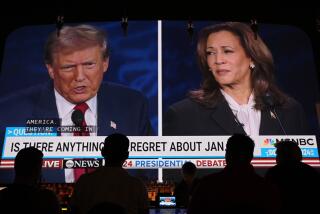Presidential debate: Will the Obama of ‘change’ show up this time?
- Share via
Andrew Sullivan of the Daily Beast noted Sunday that the Oct. 3 debate between President Obama and his Republican rival, former Massachusetts Gov. Mitt Romney, dramatically shifted the momentum in the race. Instead of fading into oblivion, Romney has overtaken Obama in the polls and is still rising.
If you’re Romney, the lesson for Tuesday’s follow-up debate is simple: be the same guy you were in the first one. That means being forceful, energized and clear, while striking the occasional safe note of moderation (e.g., “Regulation is essential.”) and parrying any attacks by Obama.
If you’re Obama, the hurdle is significantly higher. Many commenters have suggested that the president’s problem in Denver was that he seemed disengaged, even disinterested. That’s easy enough to correct; it’s just a matter of displaying the combativeness Obama shows on the campaign trail.
But as tempting as it may be for Obama to believe, is the president’s problem merely stylistic? Given how much the campaigns are spending on commercials -- Romney raised $170 million in September alone, and Obama raised $181 million, putting him close to $1 billion overall -- it’s hard to imagine that any voters (particularly those in swing states) aren’t familiar with each candidate’s basic pitch. What changed at the debate wasn’t the candidates’ messages as much as their delivery. Romney was sharp, Obama wasn’t.
There’s at least two problems with that reasoning, though. First, much of the debate was focused on policy details, such as whether Romney’s proposed tax cuts would shift tax burdens from the rich to middle- and lower-income Americans, or whether Obamacare would let the government dictate how doctors treat patients. So while there were obvious differences in presentation, there were also big differences in substance. And maybe those differences were just as persuasive, if not more so, than the candidates’ energy gap.
And second, Obama faces a challenge on substance that’s tougher than Romney’s. As the incumbent, the president has to persuade people to stick with his approach to governing. That’s hard to do when unemployment is high and economic growth is anemic. Obama could have tried to overcome this handicap by laying out a big, bold plan to create jobs and get corporate America moving again, then blaming Republicans in Congress for blocking it. Instead, he’s been offering small-bore proposals for more than a year. Are voters really going to feel outrage about Republicans sandbagging Obama’s proposal to raise taxes on businesses that export jobs, or his call to beef up career-training programs at community colleges?
All Romney has to do, by contrast, is propose a credible change in direction. He’s done that, proposing across-the-board cuts in tax rates, an overhaul of the tax code and deep reductions in federal spending. His plan won’t appeal to Democrats, and there are plenty of analysts and economists who doubt that Romney can make the numbers work. But he’s not proposing to stay the course set by Obama, that’s for sure.
Two veteran advisors to Democratic candidates, James Carville and Stan Greenberg, made the case Monday that Obama “has to offer a bold narrative, policies and choice” to voters if he expects to win in November. “The first debate really did disrupt the race and presents a painful real-time test of what happens when the president tries to convince people of progress and offer a very modest vision of future change,” they wrote. “Voters are not looking for continuity but changes that help the average Joe.”
Obama was the change candidate four years ago, but that was about transforming the way Washington operated, something Obama hasn’t done with much success. The change many voters want now is in the economy and their prospects for the future. If Obama is to reverse his slide, he needs not just to match Romney on style points at Tuesday’s debate. He has to offer a more compelling reason why he’s the candidate for voters who want this year’s version of change.
ALSO:
Republicans for ‘Sesame Street’
Kinsley: The politics of common sense
Biden and Romney: What their gaffes secretly say about them
Follow Jon Healey on Twitter @jcahealey
More to Read
A cure for the common opinion
Get thought-provoking perspectives with our weekly newsletter.
You may occasionally receive promotional content from the Los Angeles Times.











